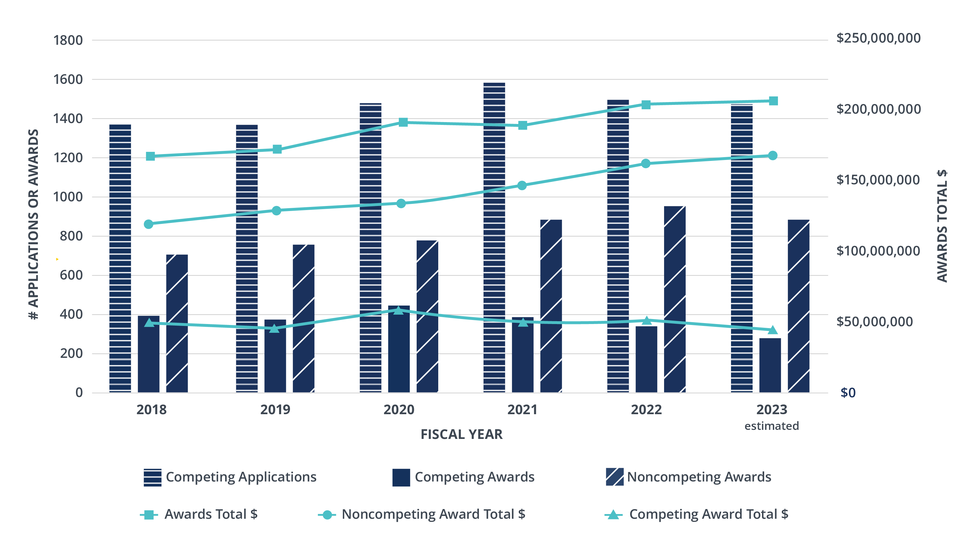NCI’s Sustained Funding and Engagement for Mentored Cancer Researchers
, by Dr. Oliver Bogler
NCI remains strongly committed to developing the cancer research workforce. In this blog, Dr. Bogler discusses trends in funding for cancer training and highlights two new resources from the Center for Cancer Training to help the research community stay informed and engaged.
NCI remains strongly committed to training the next generation of cancer researchers, and this important work is led by the Center for Cancer Training (CCT) alongside other groups at NCI, including the Center to Reduce Cancer Health Disparities. CCT provides funding to support training and education and conducts outreach to communities of undergraduates, graduate students, postdoctoral scholars, and other mentored investigators in all areas of cancer research. CCT provides opportunities and resources in support of the cancer workforce spanning a broad spectrum of research disciplines at institutions nationwide, as well as within NCI’s Intramural Research Program.
Five-Year Trends in Funding for Cancer Training from CCT
NCI’s long-standing commitment to developing the cancer research workforce is accomplished through sustained funding of mentored investigators at various career stages. Over the past 5 years, there has been a significant increase in total funding for CCT’s training portfolio, from $163 million in fiscal year (FY) 2018 to $202.5 million in FY 2022 (see figure and table below). This portfolio includes fellowships, career development awards, institutional training and research education grants, and other activities.
With these additional funds, NCI increased the total number of training awards from 1,069 in FY 2018 to 1,290 in FY 2022. This steady growth is reflected in overall increased costs for noncompeting awards, which have risen from $118.2 million in FY 2018 to nearly $157 million in FY 2022.
The growth in CCT’s training portfolio has allowed NCI to support more mentored investigators, a reflection of the institute’s strong commitment to training. At the same time, a larger training portfolio means we are supporting out-year commitments to the awards we have already made. This may put pressure on the budget available for competing awards and can result in fluctuations of new awards made in some years (see figure and table).
For example, years where we have more funding for new awards, as was the case in FY 2020, are followed by years where we have an increase in noncompeting award costs. If our overall budget increases, as it did from FY 2018 to FY 2022, then these costs can often be absorbed, along with other increases (e.g., stipend level adjustments) without cutting back on new awards. However, in years where the overall CCT budget does not change, as observed between FY 2022 and FY 2023, this can lead to reducing funds available for new mentored research and career development awards.
While NCI will always be committed to supporting the next generation of cancer researchers, the unpredictability of annual appropriations means that some years allow for fewer new investments than others.
| All Awards | 2018 | 2019 | 2020 | 2021 | 2022 | 2023 |
|---|---|---|---|---|---|---|
| Competing Applications | 1359 | 1369 | 1493 | 1596 | 1482 | 1525 |
| Competing Awards | 374 | 365 | 421 | 393 | 324 | 283 |
| Non Competing Awards | 695 | 768 | 789 | 896 | 966 | 893 |
| Total Awards | 1069 | 1133 | 1210 | 1289 | 1290 | 1176 |
| Competing Award Total $ | $45,100,765 | $42,702,104 | $55,331,448 | $43,280,217 | $45,381,694 | $42,255,723 |
| Non Competing Award Total $ | $118,199,211 | $127,537,334 | $134,047,297 | $144,772,700 | $156,971,044 | $160,270,892 |
| Awards Total $ | $163,299,976 | $170,239,438 | $189,378,745 | $188,052,917 | $202,352,738 | $202,526,615 |
|
This table displays the total funding and number of competing and noncompeting awards from 2018 to 2023 for fellowships, career development awards, institutional training and education grants, and other activities. The data for 2023 are estimates. |
||||||
New Podcast on Exploring Cancer Careers
To help the research community stay up to date on the constantly changing cancer research environment, CCT recently launched the Inside Cancer Careers podcast. The podcast showcases the personal experiences of mentored and early-career investigators in cancer research, including their transition to an independent position in any number of careers and disciplines. Invited guests also include established investigators and other professionals in the cancer field who provide insights from their career journeys as students and fellows to finding their place in science.
Inside Cancer Careers explores how researchers can thrive in a competitive environment and uncovers trends in cancer research across disciplines. It also emphasizes the importance of workplace diversity, equity, inclusion, and accessibility, all driven by networking, mentoring, and collaboration. To stay up to date on new episodes, subscribe to the Inside Cancer Careers email list.
Highlighting NCI Postdoctoral and Early Career Investigators
This past January, CCT launched a new virtual seminar series titled NCI Rising Scholars: Cancer Research Seminar Series. These monthly seminars showcase the research and achievements of NCI-supported postdoctoral fellows and early-career investigators. Speakers are identified by a bibliometric-driven approach. The seminar series highlights an array of cancer research fields, including fundamental biology, prevention, control, detection, diagnosis, and survivorship. Please visit past seminars.
The bottom line: NCI’s strong commitment to mentored cancer investigators will continue both in terms of the financial support of our grant mechanisms and in our engagement with the community. The addition of a new podcast and seminar series further enhances these efforts.
We invite you to send us feedback and suggestions at ncicct@mail.nih.gov.

